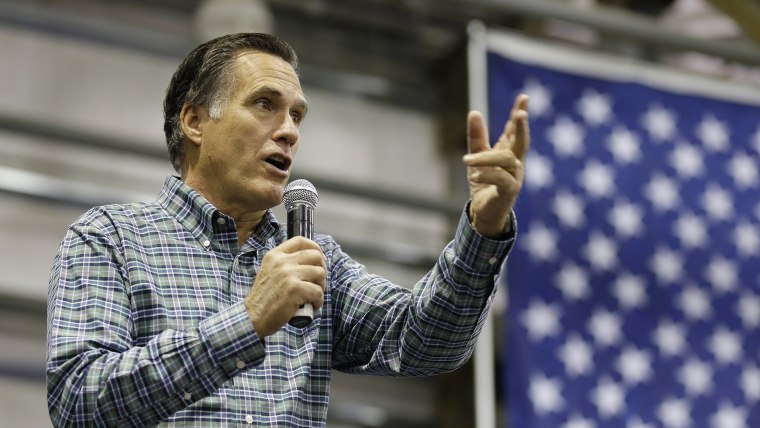Mitt Romney, after two failed presidential bids, made it quite clear there wouldn't be a third. As recently as September, the Republican conceded, "[M]y time has come and gone. I had that opportunity. I ran, I didn't win. Now it's time for someone else to pick up the baton."
The former one-term governor made similar comments over and over again. At one point last year, asked about a third attempt, Romney's exact words were, "Oh, no, no, no. No, no, no, no, no. No, no, no. People are always gracious and say, 'Oh, you should run again.' I'm not running again."
But as those who followed the 2012 race closely may recall (ahem), the gap between what Romney says and what's true is sometimes great. Kasie Hunt and Benjy Sarlin reported over the weekend:
The 2012 Republican presidential nominee told a small group of donors in New York City on Friday that he's looking at a third White House bid, said Spencer Zwick, who was Romney's finance chairman in 2012 and who attended Friday's event. "People ask if I really want to be president," Romney said, according to a source in the room. "Yeah, I want to be president."
A source close to Romney told msnbc, "He's more open to it, based on all the encouragement he's received."
To be sure, Friday's meet hardly represented a campaign kick-off. Romney hasn't said anything publicly about his intentions; he hasn't assembled a staff; and he hasn't begun fundraising. Indeed, the failed candidate may "want to be president" -- he may even feel entitled to power -- but that doesn't necessarily mean he's going to run.
It does mean, however, that Romney is thinking about it. Just as important, he apparently wants everyone -- voters, the media, GOP donors, would-be rivals -- to know he's thinking about it.
All of which leads to a few relevant questions.
How serious is Romney?
Only he can say for sure, though it's notable that Romney himself made no effort whatsoever to quash the weekend scuttlebutt. It's quite likely this is a trial balloon of sorts, intended to buy time and gauge reactions.
What kind of chance does Romney stand if he does run?
Romney was not an especially well-liked candidate, and he's no more popular now. Indeed, much of his 2012 platform, with the benefit of hindsight, seems rather ridiculous, and there's nothing to suggest there's a great public clamoring for the kind of leadership that only Mitt Romney can provide.
That said, the 2016 Republican field was supposed to feature a legion of imposing powerhouse candidates, each of whom stood a credible shot at the nomination and the presidency. With a year to go before the primaries and caucuses begin, those assumptions are changing. Indeed, no one should miss the forest for the trees: Romney probably wouldn't even consider the race if the likely GOP field wasn't filled with such unimpressive, unaccomplished candidates.
If Romney runs, would it shrink the GOP field?
Not necessarily. Paul Ryan has said he wouldn't run if Romney does, but other than him, many of those who've expressed an interest seem likely to proceed whether Romney moves forward or not.
The challenge will be for the most Romney-like candidates -- namely, Jeb Bush and Chris Christie -- who come from the same wing of the party and appeal to similar groups of supporters. The more the establishment and donor class is divided, the more wide open the race for the Republican nomination will be.
Would Romney be well received within the party?
I doubt it. Over the weekend, it seemed more Democrats were excited by the prospect of a third Romney candidacy than grassroots Republicans. Note, it was just two weeks ago that RNC Chair Reince Priebus seemed less than enthusiastic about the 2012 nominee trying again.
What's more, let's also not forget that in the immediate aftermath of the 2012 election, Republican insiders blamed Romney personally for his failure and he was quickly "turned into a punching bag" by his own allies.
Is there any precedent for this?
Not much. Many failed candidates tried again four years later, but only a handful successfully won their party's nomination, and only one, Grover Cleveland in 1892, actually won the presidency. (And if we're telling the whole story, the circumstances surrounding Cleveland's 1888 race make this a unique case.)
The other exception is Richard Nixon, but there was an eight-year gap between his narrow 1960 defeat and his 1968 victory.
Now what?
Presidential politics will be frozen for a little while. Former Romney aides, being courted by other contenders, suddenly have to wait and wonder whether their old boss is going to require their services again. The same goes for Republican donors, many of whom have been weighing which horse to back, and will now probably stay on the sidelines until they know for sure what Romney intends to do.
